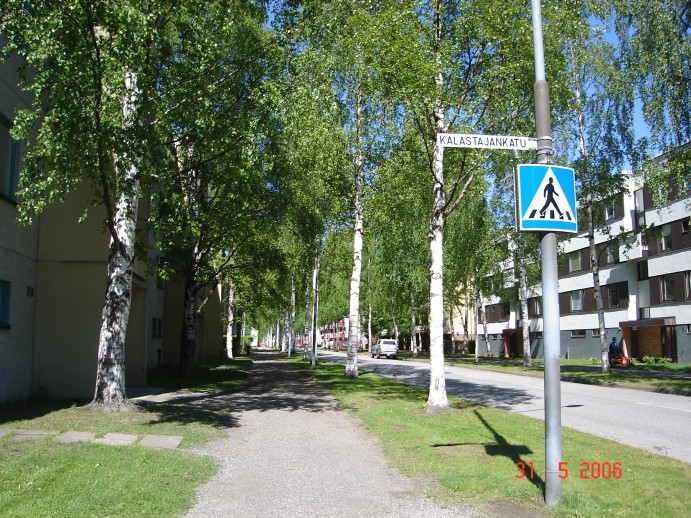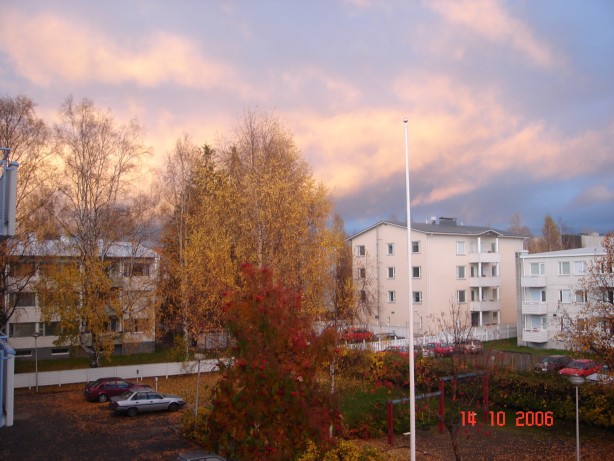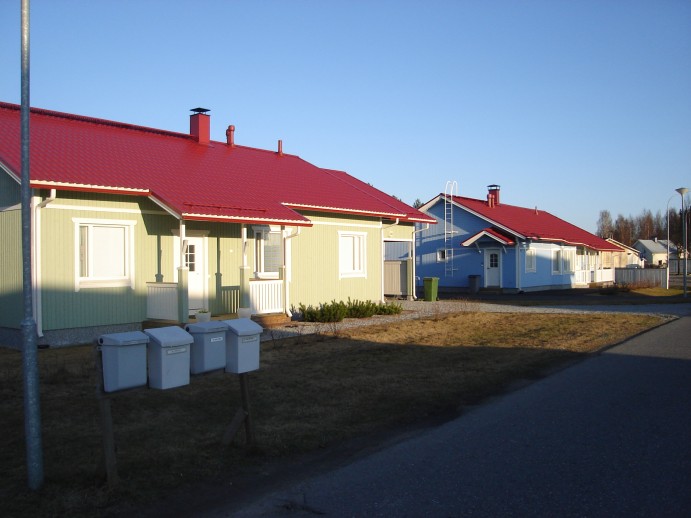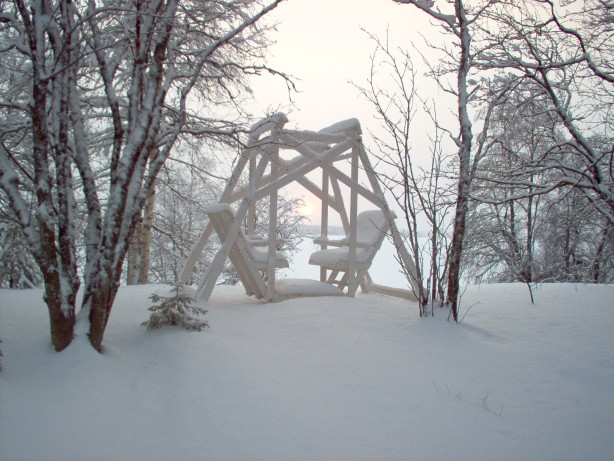Finland
We will continue the theme of life on the other side of the border with a short story about Finland (not yet ahead :)). I have been living in Finland for seven years already, I went through university and graduate school, I have a fairly complete idea of everyday life and a slightly less complete idea (mainly through the experience of friends) about career opportunities.
Let's start, probably, first - how to move (why move - decide for yourself after you finish reading to the end). In principle, there is nothing unexpected: it can be done (a) by roots; (b) for family reasons (marriage); (c) to study; (d) to work. I think that there are few who have Finnish roots or plans to immediately marry / get married, so let's go straight to points (c) and (d). However, there are plenty of people traveling on the first two points, but usually these are people from neighboring regions - Karelia and the Leningrad Region, and they themselves know very well how this turns out. With work, everything is relatively clear: it is not very easy to find, but if you have desires and abilities, it is quite realistic to get an interview. Next, a tourist visa is issued (it is not difficult), and if you are hired, the company, as a rule, will issue a work visa without any problems. And you can persuade to make a visa of class “A”, which is the first step to obtaining a residence permit. Employer number 1 in IT, of course, Nokia. But in general, the country has a very good reputation in all kinds of innovations, and there is a lot of work. It must, however, make a reservation: there are also a lot of applicants (unemployment is high), and the crisis is also felt.

')
The learning situation is a little more florid. Generally speaking, in Finland, free higher education for all - even for foreigners. That is, you can formally apply to a Finnish university, go through the competition and quietly study. The trick is that the exam and training is carried out in Finnish, and not everyone is able to pass this “firewall”. There are training programs in English - announcements are published on the Internet. Perhaps this is the easiest way for those who still want to learn, and not work. In the learning process you can hope for scholarships, but this is not the case recently. If you need money, it is better to earn money (this is officially allowed, the main thing is to find a job). Naturally, during training, you can immerse yourself in local life and understand how things are arranged here :) The student, however, does not receive an “A” visa - so that obtaining a permanent residence permit is postponed until the beginning of working life.

The standard of living within the country is fairly uniform. Cities resemble each other, and I would not say that the sensations of being in one point of a country are very different from those of another. At the same time, the capital region, of course, stands out - but not so much in terms of the standard of living as in the number and ranking of employers. That is, roughly speaking, in the average work you will receive a little more and spend a little more. However, in Helsinki you can, in principle, find a job that will not be in the province.

About salaries. There are no golden mountains here - 2,500 euros / month - a good salary, 3,500 - frankly, a good one. Although, as far as I know, the capital can offer even more abrupt conditions if lucky. Spending - I confess, I haven’t counted for a long time, but being a student, I could easily fit into 250 euros per month for food. But this, of course, is a minimum, you will need more for a comfortable life :) I will rent an apartment - around 500 e / month for 1-2 rooms in a good place. Students usually rent a room - then you can meet in 150-200 euros on the outskirts. In Helsinki, the center of the roads, closer to the suburbs, apartments are getting cheaper. However, many people immediately take a mortgage, as it seems possible - the conditions are favorable, you can pay the same money every month for a mortgage, and not the landlord. Taxes are quite high, as elsewhere in Europe - 30%, or even 40% - real numbers. However, knowledgeable people talked about various optimization schemes. Quite a lot of expenses can be excluded from the taxable base.

In general, very many people speak English, especially young people. Moreover, it is not so much dependent on the general level of education: an English-speaking bus driver or a cashier is not uncommon. I myself lived for a long time without any knowledge of the language quite successfully. In most cases, IT-related work does not require knowledge of Finnish. However, the possession of a local dialect is always useful - it expands the possibilities.

Contrary to stereotypes, the climate here is not particularly cold - affects the Gulf Stream, especially in the west. There is quite a bit of snow in Helsinki, in winter the temperature rarely drops below -10. In the north and in the east, of course, cooler. Also, contrary to stereotypes, I would not call the Finns closed and uncommunicative. However, tolerance for silence is present in their nature - smalltalk is optional. Two people can safely sit next to the plane for hours and not speak for the entire flight - this is normal. But it is also not forbidden to talk :) Peace, solitude, a good sauna, beautiful nature are appreciated - preferably a lake and a forest (there is plenty of this kind in Finland).

Attitude towards foreigners is calm. There are many foreigners here. There are a lot of Russians too, and of these, those who came by roots or through marriage and those who came to work clearly stand out. Finding the right company for communication is not difficult. I do not communicate very often with the Finns myself, but with pleasure, pleasant people can also be found among the locals. Of course, certain cultural differences exist, but this rarely gets in the way. However, Russia is a large neighboring state, and we have a special relationship with Finland, with which, of course, there are both advantages and disadvantages of a joint history.

I would call the geographic proximity to Russia a big plus - if you want, you can go to our side at least for every weekend. Trains, buses run regularly. Usually people go for holidays or shopping (they go to buy something that is not in Finland - and at the same time they go to Fink to buy something that is not there). I would say that for those who live in Russia near the border, Finland is not entirely foreign. Pitertsy will not let lie: to rent a cottage in Finland for a few days and to go for a weekend is quite in the order of things.

The social formation as a whole is built on the principle of "Scandinavian socialism" - all kinds of social programs are broad here. From here high taxes, but from here and very equal standard of living, low stratification. So, I find it difficult to call “good” and “bad” areas in our city - they are all quite good (alas, another form of migration has recently spread - refugees from the farthest corners of the world - and these people, of course, are do not reach; perhaps, where they settle, it may be slightly less comfortable, but I did not have that experience). I can also say that the social ladder is conditional: the attitude towards a cleaner or mechanic will be no less respectful than towards the head of the department. In this respect, not exactly Japan.

Virtually no homeless, very low street crime. Even in the forest, lanterns are burning, all the streets are neatly cleaned of snow and sweeping (for a cyclist it is important, but a lot of cyclists). In general, cities produce a very neat impression (although the architecture is usually simple and uncomplicated - if only it was convenient; at times it causes some boredom, however). Quite a lot of opportunities for education (including free or almost free).
Here, perhaps, for now. I am pleased to answer reasonable questions :)
Moving
Let's start, probably, first - how to move (why move - decide for yourself after you finish reading to the end). In principle, there is nothing unexpected: it can be done (a) by roots; (b) for family reasons (marriage); (c) to study; (d) to work. I think that there are few who have Finnish roots or plans to immediately marry / get married, so let's go straight to points (c) and (d). However, there are plenty of people traveling on the first two points, but usually these are people from neighboring regions - Karelia and the Leningrad Region, and they themselves know very well how this turns out. With work, everything is relatively clear: it is not very easy to find, but if you have desires and abilities, it is quite realistic to get an interview. Next, a tourist visa is issued (it is not difficult), and if you are hired, the company, as a rule, will issue a work visa without any problems. And you can persuade to make a visa of class “A”, which is the first step to obtaining a residence permit. Employer number 1 in IT, of course, Nokia. But in general, the country has a very good reputation in all kinds of innovations, and there is a lot of work. It must, however, make a reservation: there are also a lot of applicants (unemployment is high), and the crisis is also felt.

')
The learning situation is a little more florid. Generally speaking, in Finland, free higher education for all - even for foreigners. That is, you can formally apply to a Finnish university, go through the competition and quietly study. The trick is that the exam and training is carried out in Finnish, and not everyone is able to pass this “firewall”. There are training programs in English - announcements are published on the Internet. Perhaps this is the easiest way for those who still want to learn, and not work. In the learning process you can hope for scholarships, but this is not the case recently. If you need money, it is better to earn money (this is officially allowed, the main thing is to find a job). Naturally, during training, you can immerse yourself in local life and understand how things are arranged here :) The student, however, does not receive an “A” visa - so that obtaining a permanent residence permit is postponed until the beginning of working life.

Money matters
The standard of living within the country is fairly uniform. Cities resemble each other, and I would not say that the sensations of being in one point of a country are very different from those of another. At the same time, the capital region, of course, stands out - but not so much in terms of the standard of living as in the number and ranking of employers. That is, roughly speaking, in the average work you will receive a little more and spend a little more. However, in Helsinki you can, in principle, find a job that will not be in the province.

About salaries. There are no golden mountains here - 2,500 euros / month - a good salary, 3,500 - frankly, a good one. Although, as far as I know, the capital can offer even more abrupt conditions if lucky. Spending - I confess, I haven’t counted for a long time, but being a student, I could easily fit into 250 euros per month for food. But this, of course, is a minimum, you will need more for a comfortable life :) I will rent an apartment - around 500 e / month for 1-2 rooms in a good place. Students usually rent a room - then you can meet in 150-200 euros on the outskirts. In Helsinki, the center of the roads, closer to the suburbs, apartments are getting cheaper. However, many people immediately take a mortgage, as it seems possible - the conditions are favorable, you can pay the same money every month for a mortgage, and not the landlord. Taxes are quite high, as elsewhere in Europe - 30%, or even 40% - real numbers. However, knowledgeable people talked about various optimization schemes. Quite a lot of expenses can be excluded from the taxable base.

Everyday life
In general, very many people speak English, especially young people. Moreover, it is not so much dependent on the general level of education: an English-speaking bus driver or a cashier is not uncommon. I myself lived for a long time without any knowledge of the language quite successfully. In most cases, IT-related work does not require knowledge of Finnish. However, the possession of a local dialect is always useful - it expands the possibilities.

Contrary to stereotypes, the climate here is not particularly cold - affects the Gulf Stream, especially in the west. There is quite a bit of snow in Helsinki, in winter the temperature rarely drops below -10. In the north and in the east, of course, cooler. Also, contrary to stereotypes, I would not call the Finns closed and uncommunicative. However, tolerance for silence is present in their nature - smalltalk is optional. Two people can safely sit next to the plane for hours and not speak for the entire flight - this is normal. But it is also not forbidden to talk :) Peace, solitude, a good sauna, beautiful nature are appreciated - preferably a lake and a forest (there is plenty of this kind in Finland).

Attitude towards foreigners is calm. There are many foreigners here. There are a lot of Russians too, and of these, those who came by roots or through marriage and those who came to work clearly stand out. Finding the right company for communication is not difficult. I do not communicate very often with the Finns myself, but with pleasure, pleasant people can also be found among the locals. Of course, certain cultural differences exist, but this rarely gets in the way. However, Russia is a large neighboring state, and we have a special relationship with Finland, with which, of course, there are both advantages and disadvantages of a joint history.

I would call the geographic proximity to Russia a big plus - if you want, you can go to our side at least for every weekend. Trains, buses run regularly. Usually people go for holidays or shopping (they go to buy something that is not in Finland - and at the same time they go to Fink to buy something that is not there). I would say that for those who live in Russia near the border, Finland is not entirely foreign. Pitertsy will not let lie: to rent a cottage in Finland for a few days and to go for a weekend is quite in the order of things.

The social formation as a whole is built on the principle of "Scandinavian socialism" - all kinds of social programs are broad here. From here high taxes, but from here and very equal standard of living, low stratification. So, I find it difficult to call “good” and “bad” areas in our city - they are all quite good (alas, another form of migration has recently spread - refugees from the farthest corners of the world - and these people, of course, are do not reach; perhaps, where they settle, it may be slightly less comfortable, but I did not have that experience). I can also say that the social ladder is conditional: the attitude towards a cleaner or mechanic will be no less respectful than towards the head of the department. In this respect, not exactly Japan.

Virtually no homeless, very low street crime. Even in the forest, lanterns are burning, all the streets are neatly cleaned of snow and sweeping (for a cyclist it is important, but a lot of cyclists). In general, cities produce a very neat impression (although the architecture is usually simple and uncomplicated - if only it was convenient; at times it causes some boredom, however). Quite a lot of opportunities for education (including free or almost free).
Here, perhaps, for now. I am pleased to answer reasonable questions :)
Source: https://habr.com/ru/post/59906/
All Articles